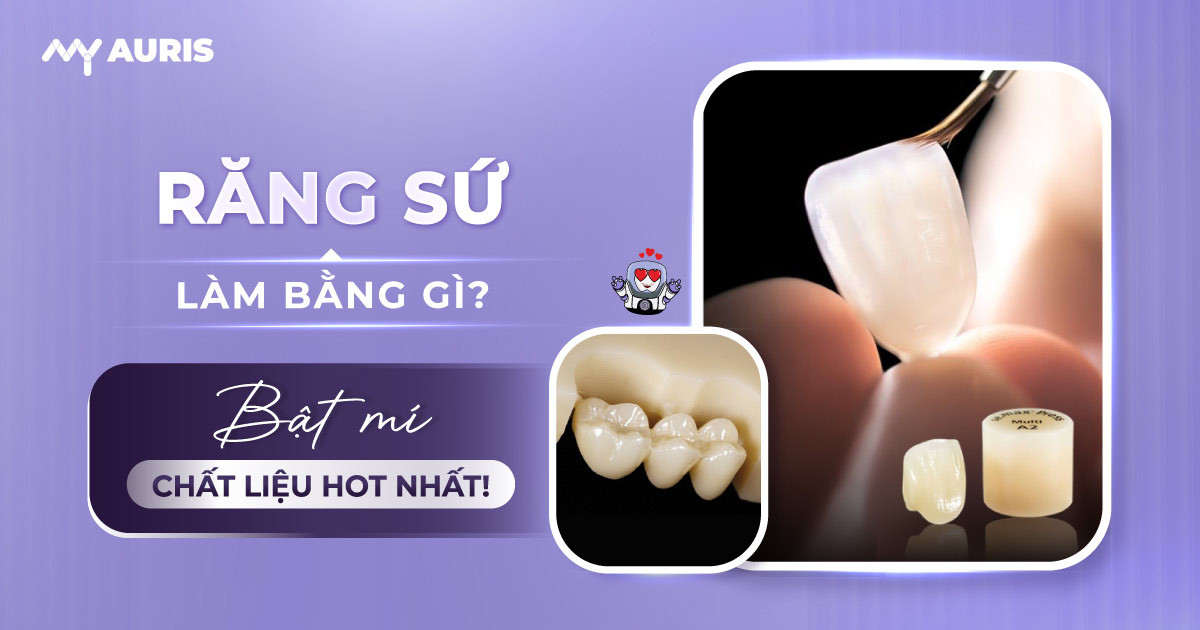What Are Porcelain Teeth Made Of And Their Outstanding Advantages
Ceramic teeth are composed of consists of two main parts: the inner layer (called the rib) is usually made from metal, Titanium or Zirconia ceramic, in which Zirconium dioxide is applied with a thickness of 0.5mm to ensure a tight fit of the teeth. The outer layer is coated with natural ceramic color and increases aesthetics. Assessing the fit of the ribs is an important step in the process of making porcelain teeth, helping to avoid risks such as tooth decay or pulp damage.
Zirconia
Zirconia porcelain teeth, ceramic material Non-metallic, leading in modern porcelain dental technology. Outstanding durability and high bearing capacity help Zirconia restore severely damaged teeth, missing teeth, porcelain bridges, and even all-ceramic teeth. Good biocompatibility ensures safety for real teeth and gum tissue. Natural color and high transparency provide outstanding aesthetics, no black gum lines like metal teeth.
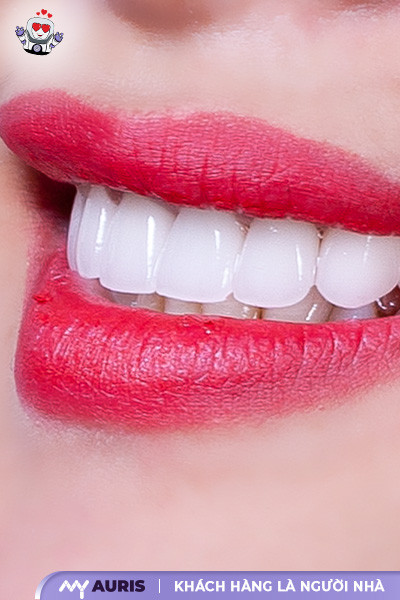
Emax
Emax porcelain teeth, all-ceramic porcelain teeth, stand out with natural aesthetics. Metal-free porcelain material, high transparency, Emax porcelain tooth color is similar to real teeth. Emax is suitable for porcelain veneers, porcelain fillings, front tooth restorations, where high aesthetics are required. Durability and bearing capacity are better than composite teeth, but not as good as Zirconia. Emax is the optimal choice for cosmetic porcelain teeth in the front teeth.

Metal porcelain
Metal ceramic teeth, a popular type of ceramic teeth, costs less than Zirconia and Emax. Metal-ceramic teeth consist of a metal frame covered with an outer ceramic layer. Durability is quite good, suitable for porcelain bridges and molar restorations. However, metal teeth can darken the gum line after a period of use, affecting aesthetics. The color of metal-ceramic teeth is less natural than zirconia and emax.
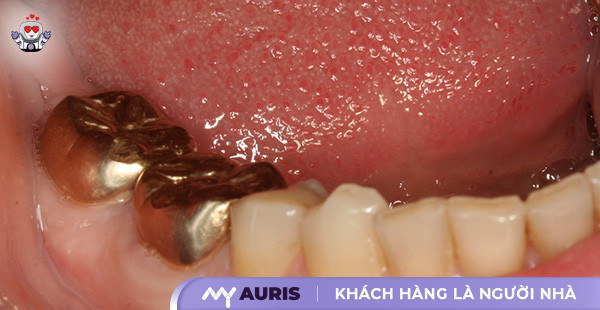
Compare the Advantages and Disadvantages of Different Types of Tooth Materials Porcelain
Are you learning about different types of porcelain teeth? Are you wondering which type is right for you to choose? My Auris will compare the pros and cons of Zirconia, Emax and metal ceramics, helping you make the right decision for your smile and oral health. Read now to discover!
| Features | Zirconia | Emax | Metal ceramic |
| Durability | Excellent, good strength | Less than Zirconia | Fair |
| Aesthetics | Limited transparency, few color options | Natural, highly transparent, diverse colors | Inferior to Zirconia and Emax, black gum line |
| Cost | Higher than metal ceramic | High | Low |
| Age longevity | High | High | Lower |
| Birthological compatibility study | Good | Good | Fair |
| Application application | Dental bridges, all-ceramic teeth, pressure-bearing areas | Bones, fillings, incisors | Wide applicability |
Selection priority:
- Aesthetic priority, front teeth: Emax
- Prioritize durability, bridge, bearing area: Zirconia
- Cost priority:Metal ceramic
Criteria for Choosing Suitable Porcelain Tooth Material
Determine aesthetic and functional needs
Each type of porcelain teeth (zirconia, emax, metal ceramic) has its own advantages and disadvantages. Front teeth require high aesthetics, so priority should be given to metal-free ceramics such as zirconia,emax. Molars need good bearing capacity, you can choose metal ceramic or zirconia. Consider porcelain veneers, porcelain bridges, porcelain fillings, all-ceramic tooth ration, all-ceramic dental system. The needs and condition of real teeth and removable dentures affect the choice.
Evaluating durability and longevity
Zirconia stands out with its durability and bearing capacity. Emax has high aesthetics and natural transparency. Porcelain metal is durable but less aesthetically pleasing. It is necessary to learn about the advantages and disadvantages of porcelain teeth and the technology of making porcelain teeth to choose the material that suits the desire for longevity of porcelain teeth.
Consider biological compatibility
Quality Porcelain tooth material must be compatible with gum tissue and not cause irritation. Zirconia, emax are benign and safe for health. Metal ceramics can cause metal allergies in some people. Consult your dentist for specific advice.
Consider cost factors
The cost of making porcelain teeth depends on the material, type of porcelain teeth, and reputable dentistry. Zirconia, emax cost more than metal ceramics. It is necessary to balance cost, quality, and aesthetics.
Learn production technology
Modern CAD/CAM technology helps produce accurate, aesthetic porcelain teeth. Choose a reputable dentistry with modern equipment and experienced dentists to ensure the quality of porcelain teeth. Learn about the process of making porcelain teeth and warranty on porcelain teeth before deciding.
Pay attention to the color of porcelain teeth
The color of porcelain teeth needs to be in harmony with real teeth, creating a smile natural. The color palette of porcelain teeth is diverse, helping you choose the color that suits your skin tone and face.
Modern Porcelain Teeth Production Technology: From Cad/Cam to a Perfect Smile Hao
CAD/CAM technology: Revolution in dentistry
CAD/CAM technology is a great step forward. CAD (Computer-Aided Design) designs porcelain teeth on the computer. CAM (Computer-Aided Manufacturing) uses machines for manufacturing. This process ensures accuracy, aesthetics and shortens time compared to traditional methods.
Steps:
- Examination and consultation: Dentist checks real teeth, advises on the type of porcelain teeth (Zirconia, Emax, metal porcelain) that suits your needs and budget. They also explain the pros and cons of each type. For example, Zirconia is highly durable, Emax has good aesthetics, and metal ceramics have lower costs.
- Taking dental impressions: Use mDigital scanner to create 3D jaw models, eliminating the discomfort of taking impressions with molds.
- Computer design (CAD): Dentists design porcelain teeth on specialized software, ensuring bite, color, and shape in harmony with the face.
- Machine Manufacturing (CAM): Data from the computer is transferred to the CNC lathe. The lathe automatically cuts porcelain blocks into porcelain teeth with high precision.
- Porcelain tooth attachment: After completion, the porcelain tooth is permanently attached to the real tooth using specialized materials. The dentist checks the bite, ensuring chewing function and aesthetics.
CAD/CAM technology brings many benefits: Absolute accuracy, shortened treatment time, high aesthetics, longer lifespan of porcelain teeth.
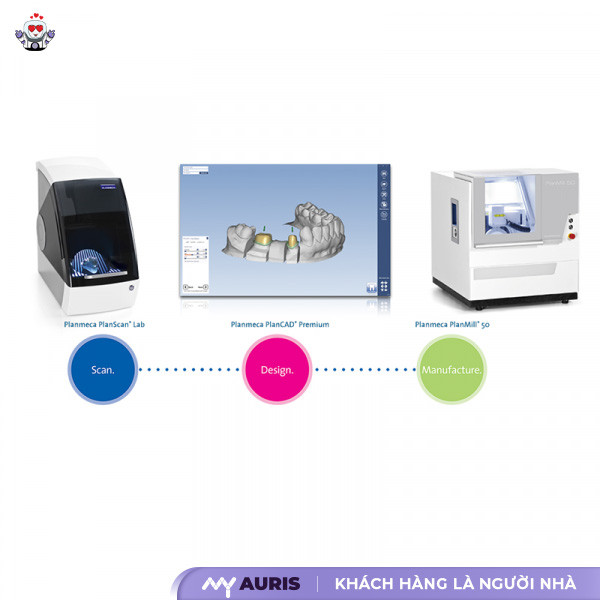
Other technology: Improving the quality of porcelain teeth
Besides CAD/CAM, there are many other modern technologies:
- Porcelain pressing technology: Creates all-ceramic teeth with high transparency, natural aesthetics, and good biological compatibility. Suitable for porcelain veneers, porcelain bridges, and all-ceramic dental ration.
- Ceramic firing technology: Increases durability, bearing capacity, and longevity of porcelain teeth. Applicable to metal-ceramic teeth and all-ceramic teeth.
The choice of technology depends on the ceramic tooth material, needs, and budget. The dentist will advise on the best choice. Regardless of which technology is chosen, the production process complies with strict standards, ensuring quality and health.
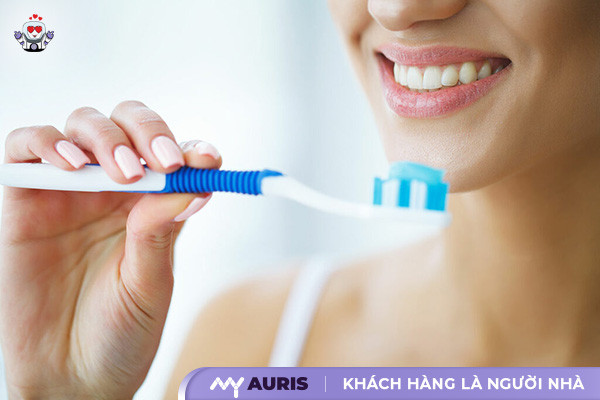
Caring for Porcelain Teeth Properly to Extend Your Life Tho
Daily oral hygiene: The foundation for healthy porcelain teeth
Maintaining oral hygiene is the first and most important step. Use a soft-bristled toothbrush to brush gently at least twice a day, after each meal. Brush in circular motions, focusing on the gum line. Don’t forget to clean between your teeth with dental floss. Rinsing with specialized mouthwash also helps remove bacteria, plaque, protect gums and real teeth, and increases the lifespan of porcelain bridges, porcelain veneers or porcelain fillings. Choose toothpaste containing fluoride to strengthen real tooth enamel and support the all-ceramic tooth system.
Diet: Factor that directly affects the durability of porcelain teeth
Limit hard, chewy foods, sweets and carbonated drinks. They can chip, break, and discolor porcelain teeth, reducing the lifespan of all-ceramic teeth. Prioritize fruits and vegetables, foods rich in calcium and vitamin D, which are good for real teeth and gums, indirectly protecting porcelain teeth. Avoid chewing ice, biting pens, and opening bottle caps with your teeth. These habits cause great pressure, damaging porcelain teeth, especially metal teeth, composite teeth and even temporary teeth. Choosing the right food helps maintain the durability, color and aesthetics of porcelain teeth, whether they are zirconia, emax or metal-free porcelain.
Regular dental check-ups: Ensure tooth health comprehensive mouth
Regular dental check-ups every 6 months are essential. The dentist checks the condition of porcelain teeth, real teeth, and gums, detecting potential problems early. Professional cleaning at the dental clinic removes plaque, tartar build-up, and areas that are difficult to clean at home, helping to maintain the transparency, biocompatibility, and load-bearing capacity of porcelain teeth. Complying with the appointment schedule helps prolong the life of porcelain teeth and ensures long-term oral health. A reputable dentist with CAD/CAM technology, international standard porcelain tooth making process and good porcelain tooth warranty will be the optimal choice.
Choosing the right ceramic tooth material: Investing in a lasting smile solid
Learn about the pros and cons of porcelain teeth and the technology of making porcelain teeth before deciding. Choose materials suitable to your needs and economic conditions. Teeth, porcelain, materials, and health are important factors to consider. Aesthetic porcelain teeth, metal porcelain teeth, and all-ceramic porcelain teeth, each type has its own advantages and disadvantages. Consult your dentist to make the right decision, ensuring durability, aesthetics, porcelain tooth color, transparency, optical properties, abrasion resistance, Mohs hardness, thermal expansion coefficient, opacity, good bearing capacity, good biocompatibility, long life.

My Auris Dentistry: Prestigious Porcelain Dentistry Address in Ho Chi Minh City
Are you looking for a confident smile with perfect teeth? My Auris Dental is a reputable address in Ho Chi Minh City, specializing in providing high quality porcelain dental services. With a team of experienced dentists, modern technology and high-quality ceramic materials, we are committed to bringing you the best porcelain dental experience.
At My Auris Dental, we understand that oral health is an important factor. We put your safety and comfort first. A team of dedicated, experienced dentists, well-trained in advanced porcelain dental techniques. We use modern CAD/CAM technology, ensuring high accuracy and aesthetics for each piece of all-ceramic teeth, porcelain veneers, and porcelain bridges. High-quality porcelain dental materials such as zirconia, emax, and non-metallic porcelain are imported from genuine sources, ensuring durability, natural color and good biocompatibility.
My Auris Dental is a reputable and trustworthy dental address in Ho Chi Minh City. We are committed to providing you with quality, safe and aesthetic porcelain dental services. Contact us now for a free consultation.


